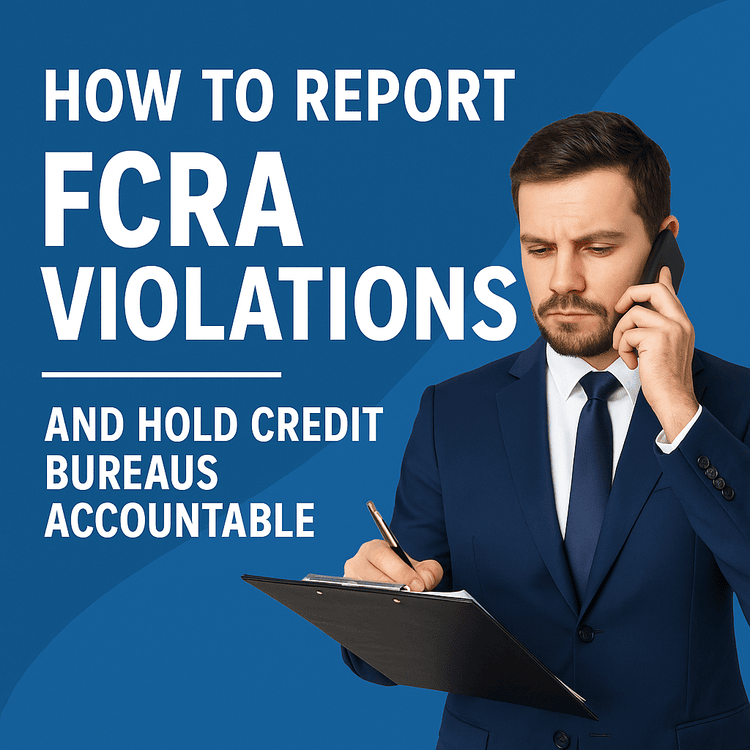If you’ve found inaccurate or damaging information on your credit report, you are not alone. Every year, millions of Americans struggle with errors on their credit reports that can impact their ability to secure housing, employment, or credit. Fortunately, the Fair Credit Reporting Act (FCRA) is a federal law that gives you rights—and teeth—to challenge these mistakes and seek justice. At Jaffer Law, we specialize in helping consumers nationwide fight back against credit reporting errors and background check inaccuracies.
In this comprehensive guide, we’ll explain:
- What constitutes an FCRA violation
- How to report an FCRA violation
- The steps to take before filing a lawsuit
- How Jaffer Law can help you seek compensation and correction
What Is an FCRA Violation? The FCRA governs how consumer reporting agencies (CRAs) like Equifax, Experian, and TransUnion collect, manage, and share your information. It also applies to background check companies and debt collectors that furnish data to the CRAs. Violations of the FCRA can take many forms, including:
- Failing to investigate a credit dispute within 30 days
- Reporting inaccurate or outdated information
- Mixing your file with another consumer (“mixed file” errors)
- Listing a consumer as deceased
- Failing to mark a debt as disputed
- Providing credit reports to unauthorized parties
Even a single error can lead to credit denials, job rejections, or increased interest rates. The FCRA protects you by requiring accurate reporting and fair handling of disputes.
Step 1: Identify the FCRA Violation Start by carefully reviewing your credit reports. You can obtain free copies once per year from all three major bureaus at AnnualCreditReport.com. Look for red flags such as:
- Accounts you don’t recognize
- Incorrect balances or payment histories
- Collections that were paid or settled
- Wrong names, addresses, or Social Security numbers
- Public records like bankruptcies or judgments that aren’t yours
Also, keep an eye on background check reports if you were denied employment, housing, or insurance.
Step 2: File a Dispute in Writing To preserve your rights under the FCRA, you must first send a written dispute to the credit reporting agencies and, if applicable, to the furnisher (such as a lender or debt collector). Your dispute letter should include:
- Your full name and address
- A clear description of the error
- Supporting documents (e.g., identity theft report, payment receipts)
- A request to correct or delete the inaccurate information
We recommend sending the dispute via certified mail with return receipt to create a paper trail. The CRAs then have 30 days to investigate and respond.
Step 3: Wait for the CRA’s Response Under the FCRA, the CRA must:
- Investigate your dispute within 30 days
- Notify the furnisher (data provider)
- Review and consider all relevant evidence
- Provide you with the results of their investigation
If they confirm the error, they must correct it on your report. If they verify incorrect information without proper investigation, that may be grounds for a lawsuit.
Step 4: Gather Evidence of Harm If the error persists or if the CRA fails to respond properly, start collecting evidence. Examples include:
- Loan denials or adverse action letters
- Higher interest rates
- Job application rejections
- Emotional distress, stress-related illnesses
- Lost housing opportunities
Keep documentation such as emails, rejection letters, and financial statements that show the impact the error has had on your life.
Step 5: Contact Jaffer Law for Help FCRA claims can be complex, and the credit bureaus have aggressive legal teams. That’s where we come in. At Jaffer Law, we:
- Evaluate your case at no cost
- Draft and send effective dispute letters
- Build a solid claim with evidence of FCRA violations
- File lawsuits in federal court when appropriate
- Negotiate settlements or pursue damages through trial
Why Choose Jaffer Law
- Nationwide Representation: We help consumers nationwide.
- No Upfront Fees: We don’t get paid unless you win.
- Experience You Can Trust: Our attorneys focus exclusively on FCRA and consumer protection law.
- Proven Track Record: We have recovered millions for clients harmed by credit reporting and background check errors.
What Can You Recover in an FCRA Case? If a CRA or furnisher willfully violates the FCRA, you may be entitled to:
- Statutory damages ($100 to $1,000 per violation)
- Actual damages (financial losses, emotional distress)
- Punitive damages (for willful violations)
- Attorney’s fees and court costs
In negligent violation cases, you may recover actual damages and costs.
Real-Life Success Story One of our clients was wrongly listed as deceased on their credit report, preventing them from getting a mortgage. We took on the case, and after filing a lawsuit, the credit bureau corrected the error and paid a substantial settlement.
Take Action Today Credit reporting errors can cost you more than just points on your score—they can disrupt your life. The good news is you don’t have to fight alone. Jaffer Law is here to help you report FCRA violations and hold credit bureaus accountable.
Let us fight for your rights and restore your good name.

